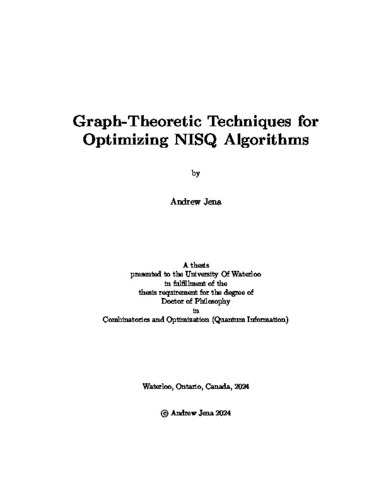| dc.contributor.author | Jena, Andrew | |
| dc.date.accessioned | 2024-02-15 20:21:26 (GMT) | |
| dc.date.available | 2024-02-15 20:21:26 (GMT) | |
| dc.date.issued | 2024-02-15 | |
| dc.date.submitted | 2024-02-14 | |
| dc.identifier.uri | http://hdl.handle.net/10012/20343 | |
| dc.description.abstract | Entering the NISQ era, the search for useful yet simple quantum algorithms is perhaps of more importance now than it may ever be in the future. In place of quantum walks, the quantum Fourier transform, and asymptotic results about far-term advantages of quantum computation, the real-world applications of today involve nitty-gritty details and optimizations which make the most use of our limited resources. These priorities pervade the research presented in this thesis, which focuses on combinatorial techniques for optimizing NISQ algorithms.
With variational algorithms directing the discussion, we investigate methods for reducing Hamiltonians, reducing measurement errors, and reducing entangling gates. All three of these reductions bring us ever closer to demonstrating the utility of quantum devices, by improving some of the major bottlenecks of the NISQ era, and all of them do so while rarely ever leaving the combinatorial framework provided by stabilizer states. The qubit tapering approach to Hamiltonian simplification which we present was developed independently of the work by Bravyi et al., who discovered how to reduce qubit counts by parallelizing the computation of the ground state. The measurement scheme we describe, AEQuO, is built upon years of research and dozens of articles detailing, comparing, and contrasting a plethora of schemes. The circuit optimization technique we introduce answers a question posed by Adcock et al., and our ideas and proofs are fundamentally grounded in the literature of isotropic systems and the graph-based results which have followed from it. | en |
| dc.language.iso | en | en |
| dc.publisher | University of Waterloo | en |
| dc.subject | quantum computing | en |
| dc.subject | quantum algorithms | en |
| dc.subject | NISQ | en |
| dc.subject | Clifford | en |
| dc.subject | Pauli | en |
| dc.subject | combinatorics | en |
| dc.subject | graph theory | en |
| dc.subject | VQE | en |
| dc.subject | variational quantum algorithms | en |
| dc.subject | quantum chemistry | en |
| dc.title | Graph-Theoretic Techniques for Optimizing NISQ Algorithms | en |
| dc.type | Doctoral Thesis | en |
| dc.pending | false | |
| uws-etd.degree.department | Combinatorics and Optimization | en |
| uws-etd.degree.discipline | Combinatorics and Optimization (Quantum Information) | en |
| uws-etd.degree.grantor | University of Waterloo | en |
| uws-etd.degree | Doctor of Philosophy | en |
| uws-etd.embargo.terms | 0 | en |
| uws.contributor.advisor | Mosca, Michele | |
| uws.contributor.affiliation1 | Faculty of Mathematics | en |
| uws.published.city | Waterloo | en |
| uws.published.country | Canada | en |
| uws.published.province | Ontario | en |
| uws.typeOfResource | Text | en |
| uws.peerReviewStatus | Unreviewed | en |
| uws.scholarLevel | Graduate | en |

